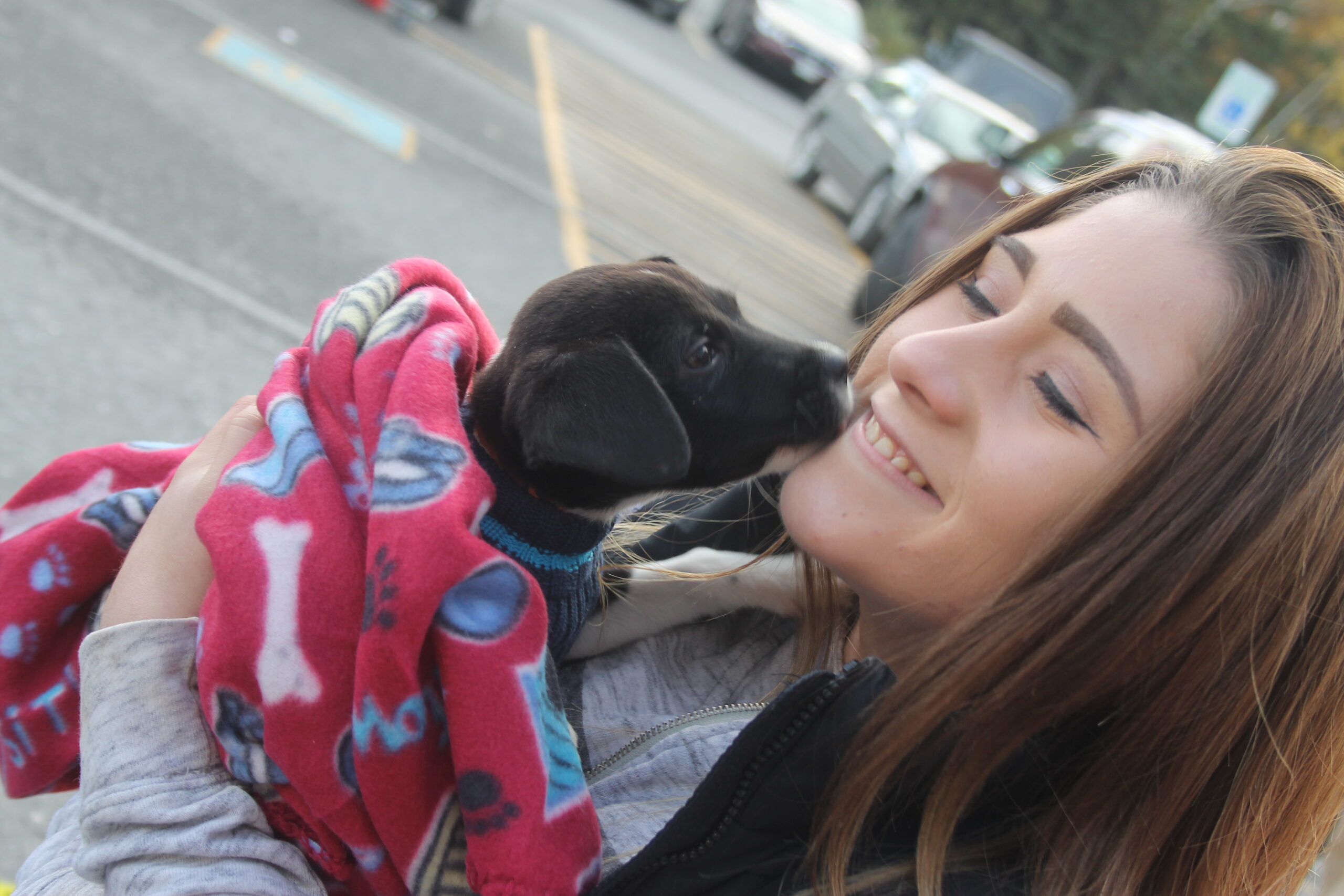
MADAWASKA, Maine — More than 75 cajun puppies made their way to Aroostook County from Louisiana last week to find new Acadian homes. Both puppies and owners appeared to leave happy with each other, though a scare developed later when three of the animals were diagnosed with parvovirus.
But on Saturday morning, excited barks, woofs, and ruffs were heard all over the Tractor Supply store parking lot in Madawaska where a line of close to 100 people formed at 10 a.m. for a chance to adopt the dogs.
Many of the dogs wore sweaters to keep them warm since they were brought from a humid 85-90 degrees, up to a chilling mid 30s. One puppy named KeeKee was wrapped in a fleece blanket held by 17-year-old Jessica Shaw.
“It’s a surprise for my little sister,” Shaw said of sibling Samantha. “She’s adopting a dog today and she doesn’t know it.”
According to Caitlin Hemphill, president of the Heart of Louisiana Humane Society, the organization chose the northern Maine location to host the event because of the overwhelming request for dogs to adopt in The County.
“In the south, we have a major overpopulation problem, animals are dying in kill shelters everyday,” Hemphill said. “A lot of people wanted to adopt up here, so we planned an event and it took off like wildfire.”
Hemphill was a foster parent for a young 3-pound, 3-year-old Chihuahua named India that she brought to Madawaska to find a family to adopt.
“She’s perfect — I’ve actually grown very attached to her,” Hemphill said Saturday, choking back tears. Before long, however, she changed her mind and decided to keep the pet, officially adopting India herself.
“So my foster dog traveled 2,025 miles for me to end up adopting her in Maine,” she said Wednesday.
Some of the puppies were pre-adopted by area residents, who traveled from other parts of The County to pick them up. The remaining puppies were on display and all adopted out before the end of the day.
But by Monday, panic ensued with scores new owners commenting online and sharing a post by a veterinarian on the Fort Kent Animal Hospital Facebook page.
The post by Dr. Christiana Yule warned pet owners that the office had received calls about “multiple sick dogs from the adoptions at Tractor Supply,” and told readers that two possible diseases might have traveled up with the dogs, including parvovirus and canine influenza.
Parvo is a very serious, highly contagious disease that is often fatal in puppies. Symptoms include bloody diarrhea, fever, vomiting, loss of appetite and rapid weight loss, according to www.healthcommunities.com.
Canine influenza is not usually fatal, with symptoms including coughing, sneezing, difficulty breathing and nasal discharge., according to pets.webmd.com.
“If you adopted a dog or if your dog visited Tractor Supply with you, please monitor closely for illness and proceed to the nearest emergency hospital at the first sign of trouble,” Yule stated in her post. “Our small hospital is not equipped to hospitalize a large number of sick dogs at once and we will not be able to accommodate you, so do not wait to be seen here.”
After Hemphill learned of the post, she said she called Yule, who, according to Hemphill, admitted that there was not an influx of sick animals at her clinic, but that she posted the warning to inform her clients about the possible risks. Yule did not see any of the animals but received two calls, one about a sick puppy and the other about a dog that coughed, according to Hemphill. Hemphill rebutted the post with one of her own which she posted to the Heart of Louisiana Humane Society Facebook page.
“We make this post to inform you that [all of the adopted dogs] have received 3-4 vaccinations, bordetella, rabies, dewormed, microchipped, spayed/neutered and on heartworm/flea prevention,” Hemphill wrote. “However, we have had 3 cases of parvovirus from the same litter of 3 puppies. They are currently being treated at the vet now.”
Hemphill later confirmed that the three puppies in question were taken to veterinarians in Presque Isle and Houlton. She said Wednesday that all three had died.
When reached by phone Tuesday, Yule declined further comment outside of referring the reporter to an edited post that stated the original post was not intended to start a panic. She further states in the post that current and future clients should “not expect any further alerts regarding any outbreaks of illness. We are sorry we will not be able to communicate effectively with our own clients regarding this matter.”
Hemphill said random dogs among the groups brought to Maine for adoption were tested for parvovirus as required by the state. She said Maine required the organization to test 10 of the dogs and the society went beyond that requirement and tested 15 from the different groups and litters.
She said she wanted to be as open about the situation as possible but that this was not something that could be foreseen as the society had taken all of the necessary steps to transport and prepare the dogs to find their forever homes.
“We’ve done everything, taken every precaution, done everything we’re supposed to do and even went above and beyond,” Hemphill said.
“Bottom line, transport is very stressful,” she said about the 38-hour drive across 2,025 miles that cost the organization $22,000.
Dustin Cook, practice manager for the Presque Island Animal Hospital, said Monday that the facility was seeing a patient from the adoption event but could not “discuss their care.” However, Cook added,“We don’t have any indication of any serious outbreak or anything along those lines.”
“If there are any signs that raise concern, then [dog owners] should call their veterinarian, and then they can discuss either yes, to come in, or no, these are normal signs for a puppy or dog of any age,” Cook said.
Originally, the Heart of Louisiana Humane Society also had planned to donate $1,000 to the PAWS animal shelter for cats out of Fort Kent. However, after officials from both organizations spoke, PAWS declined the donation due to the fact that both groups are non-profit, according to Hemphill.




